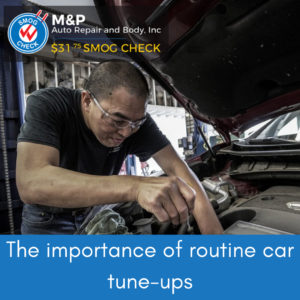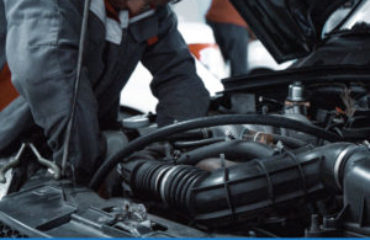When you bring your car in for a regular tune-up, you are not only getting it tuned up for optimal performance but also to make sure that your vehicle is safe. Regular maintenance can make sure that your car will last longer and be more reliable. It can even save you money in the long run because you’ll be able to avoid costly repairs down the road!
Most vehicles are made to run well for about five years if they’re properly maintained. After that time, parts will be starting to break down and need replacing at an alarming rate. The specific mileage of your car can affect the time in which you should have routine maintenance completed; generally, it’s every three months or every 10,000 miles.
 What is a tune-up?
What is a tune-up?
A tuneup is a term that car owners use to describe the various repairs and maintenance tasks that are completed at an auto shop or garage. These include checking spark plugs, belts, hoses, oil levels, air filters, tire pressure, and more. A typical tune-up takes around two hours to complete, and the cost depends on your make and model of car but can range from $100 to $250. Some of the most common signs that your car might need a tune-up to include:
- Poor gas mileage
- Rough idling or starting
- Car is making noise when idling or driving (sputtering, backfiring)
- Lights dim when RPMs increase
- Spark plug wire(s) is/are broken or melted
6 Tips to Avoid Repairs on Your Vehicle.
- Get an oil change. Changing your car’s oil on a regular basis is one of the most important maintenance tasks to keep your car running smoothly. You’ll also want to make sure you’re using the right type of oil for your vehicle- not all oils are designed equally!
- Change your filters. Every time you get an oil change, the mechanic will likely be replacing certain filters in your engine, too. Make sure to change or clean these often for more efficient performance.
- Rotate your tires. Yes, this means changing them all around so they wear evenly! This is very important because when you neglect this, it can lead to costly repairs in the future.
- Check tire pressure with a tire gauge. It’s no secret that tires are important, but did you know they’re equally as important to keep properly inflated? Make sure to check your tire pressure at least once per month; over or under-inflated tires can be dangerous!
- Check belts and hoses for wear and tear. If you don’t stay up-to-date with your vehicle’s belts and hoses, you could be in a very dangerous situation! The engine can’t work without them, so make sure to inspect these regularly.
- Keep up with other maintenance tasks. Such as changing the air filter, airing up tires that have been low on air, or even tightening loose screws that might be affecting your car’s performance.
What are some of the most common car problems?
The most common car problems are the result of negligence or failing to perform routine maintenance. The top four most common problems include dirty air filters, unsafe tires, faulty hoses and belts, and misaligned wheel alignment. When you neglect these problems, your vehicle becomes a hazard not only to yourself or others on the road but can also be unsafe for you and your passengers.
You may be thinking, “what could possibly go wrong with a car?” However, the truth is that cars are delicate pieces of machinery. In addition to regular tune-ups, your car may have issues from time to time. Here are some common problems:
- Spark Plugs – These are critical to getting your car started. If they wear out, the car won’t start!
- Battery – After a time, batteries simply stop working. It’s important to replace them before that happens or you could end up stranded somewhere.
- Tires – Make sure that you check your tire pressure regularly because it will decrease with time. If your tires are low, you could have problems getting enough traction to accelerate
- Timing Belt – This belt needs replacing every so often, so get in the habit of checking your owner’s manual or asking your mechanic when yours should be replaced.
- Air Filter – A clogged air filter will result in decreased gas mileage and power.
You’ll be able to avoid some of these problems if you get your car tuned up on a regular basis, rather than waiting for something to go wrong. Your mechanic can also check your brakes and test your coolant. So, save yourself time and money! Make an appointment at your local auto repair shop.
What are the best conditions for an oil change?
The best conditions for an oil change are:
- A cool engine and plenty of time (10 minutes) to let the oil drain.
- Clean catch pan and a minimum of two quarts of oil (5W-30). You might want more if it’s been a long time since your last oil change.
- Properly sized wrench to remove the drain plug on your engine, as well as a box or can to store old grease.
- A clean garden hose with a spray nozzle, along with a container that can hold up to 3 gallons of water for rinsing out your oil collector/drain pan and into which you will pour fresh water from the garden hose.
If you’re changing your oil at home, make sure to park the car on a level surface. If it isn’t, put something under the wheels that will keep them level (like wood blocks).
Why is it important to check tire pressure?
One of the most important parts of taking care of your car is checking your tire pressure. Too much or too little air can cause major problems. Low-pressure tires can lead to premature wear on the inner lining and rims, while overinflated tires can cause cracking in the sidewalls or bead area. DO NOT try to adjust the tire pressure yourself- let a professional handle it!
It is important to check tire pressure because if you don’t, it can cause problems on the road. For example, tires with too little air will use up all their air more quickly and your car will burn more gas. This will also make it less safe to drive your car until the problem can be fixed. It’s easy to check tire pressure – all you need is a good quality tire pressure gauge!
Locate the tire pressure gauge on your car (it may be in the glove compartment). Read the tire pressure label on the back of one of your tires and record it. Then, go to all four tires and read each tire’s pressure level. After recording each tire’s levels, add them up and divide by 4 to find out what is the average tire pressure for all of your tires. This is the tire pressure that the manufacturer suggests, but it’s always a good idea to check it again when you are about to fill up with gas because this increases with air temperature.
Are you ready for a car tune-up?
Bring your car into M&P Auto Repair & Smog Check Inc. for a tune-up right away to prevent a minor issue from becoming a big problem. Our certified technicians will handle your car with care, provide an honest estimate for repairs, and get back on the road as quickly as possible.
Call us today at 562-218-1280 to schedule your tune-up.


